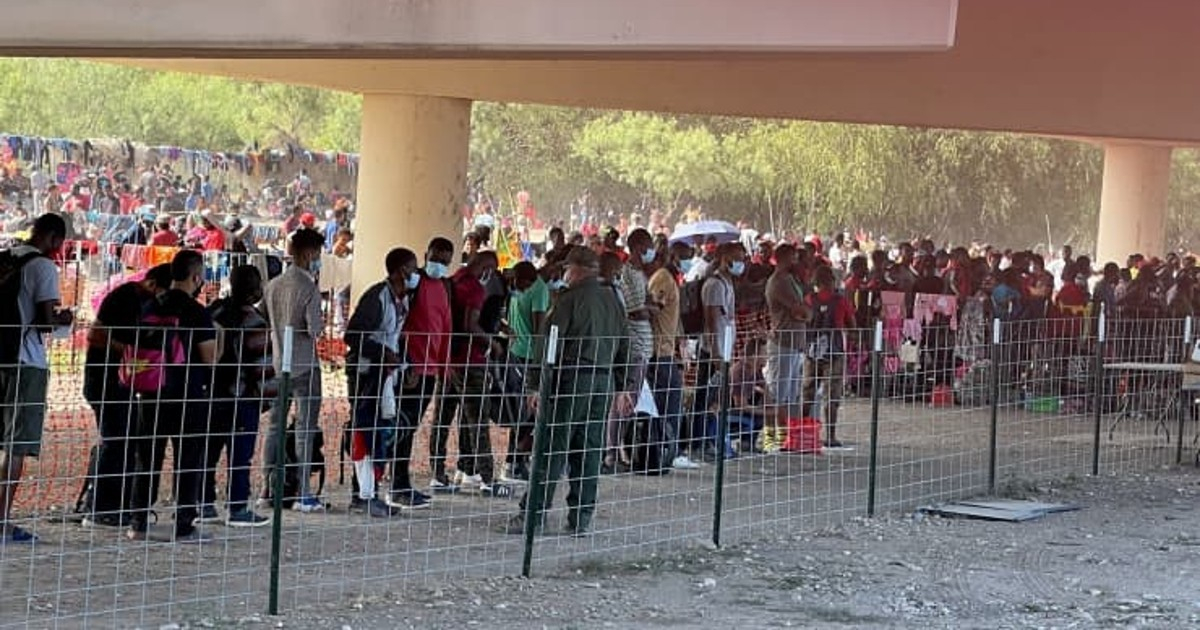
PORT-AU-PRINCE / PEUMO, CHILE, Dec 13 (Reuters) - Like thousands of other Haitian migrants, Eric Jean Louis left his home and job in Chile at the beginning of this year to travel thousands of kilometers to the United States after hearing that he could receive asylum under the Joe Biden administration.
His hopes were dashed when U.S. officials in Del Rio, Texas, returned him in September to Haiti, a place he left 14 years ago and which he said had become unrecognizable, torn apart by gang violence.
After six weeks in which he felt like he was "going back to hell," the 47-year-old pooled money from his friends to buy a plane ticket to Chile, willing to give the country another chance, even if it meant starting over in a place where, according to Jean Louis, life is not easy and Haitians sometimes faced racism.
But it's still better than home.
"Since I've been here, I barely sleep at night. I'm afraid," said Jean Louis in Port-au-Prince, shortly before leaving for Chile with his wife and four relatives in November.
Jean Louis' family and other people with money and the right visas are part of a new migratory triangle, returning to places in the Southern Cone that they had just left, and abandoning, for now, their American dream.
As rumors grew among communities in Chile and Brazil that Haitians were being allowed to cross the Mexico-U.S. border to seek asylum, a camp under the Del Rio International Bridge filled with 14,000 people in September seeking to enter the United States.
It became a symbol of Biden's fight to stop the record number of migrants at the border.
Nearly 8,000 Haitians were ultimately expelled from Del Rio to Haiti, according to U.S. authorities. Almost all of them had previously lived in Chile or Brazil, countries that in the last decade have welcomed tens of thousands of people fleeing poverty on the island.
Dozens of those expelled have since returned to Chile or Brazil, estimated Giuseppe Loprete, head of mission of the International Organization for Migration in Haiti.
That figure is likely to increase, but slowly, given the challenge of organizing immigration procedures and finding thousands of dollars so that entire families can travel.
"They lost what little they had, and now they're back to square one," Loprete said.
Last month, at Port-au-Prince's Toussaint Louverture airport, a Reuters reporter spoke with three Del Rio deportees, some with their families, flying to Chile and Brazil.
All said they hoped to never return to Haiti due to worsening violence and political unrest.
Since the assassination of President Jovenel Moise in July, the gangs have expanded their influence, increasing kidnappings that target both locals and foreigners. Migrant advocacy groups and a Biden special envoy criticized the US decision to return people to Haiti during this chaos.
Jean Louis' return to Haiti coincided with a month-long blockade of fuel supplies by gangs, causing crippling gasoline shortages and preventing him from seeing his relatives. Fear of gangs kept him from even leaving his house, he said.
"THERE IS NOTHING FOR ME"
Juvenson Sudney, 25, left Haiti in 2015 for Brazil. In July of this year, hoping to escape the economic malaise in South America and join an uncle in Florida, he made the trip to the United States.
He arrived as far as Del Río, and then was boarded on a plane to Haiti. But the turmoil in Haiti pushed him to return to Brazil, where he became a naturalized citizen.
"There is nothing here for me," he said at the Port-au-Prince airport.
Other Haitians have found it difficult to return to South America. Four people expelled from Del Rio told Reuters they were struggling to pay for plane tickets and get proper visas.
Some left Chile while awaiting renewal of their visas, and now face stricter visa rules starting in 2018. Chile's immigration office did not respond to a request for comment.
Brazil's Foreign Ministry said it could "facilitate" the return to Brazil of families in which children were born in Brazil, and that foreigners with Brazilian spouses can obtain entry visas. Others will be dealt with on a case-by-case basis, the ministry said.
Joao Chaves, a Brazilian federal public defender who works with migrants, said he was helping two families with children born in Brazil - who were also sent to Haiti from Del Rio - apply for plane tickets from the Brazilian government for the return trip. .
Migrant advocates say visa applications for Haitians in Chile and Brazil are backed up, in part because of the pandemic.
Jean Louis, who has a permanent residence visa in Chile, said he spent $8,000 crossing Central America and Mexico to reach Del Rio, depleting his savings. Some friends helped him and his wife buy tickets to Chile for about $710 each.
Once he and his family landed in Santiago, they were held at the airport for six hours for COVID-19 testing and paperwork.
"I asked God to let us enter Chile, it was my only hope," he said.
Back in his old hometown of Peumo, in Chile's wine region, a couple of hours south of Santiago, he told his friends how Haiti had changed.
His boss welcomed him to his janitor position, but Jean Louis turned him down and opted for a factory job. He also rejected offers from friends to return belongings he had given away.
"I want to start over," he said.
Although he feels relieved to be back in Chile, remorse gnaws at him. "Everyone knows I went on this journey of misfortune," he said. "And that I failed."
(Reporting by Gessika Thomas in Port-au-Prince, Daina Beth Solomon in Mexico City and Iván Alvarado in Peumo, Chile; Additional reporting by Brian Ellsworth in Miami and Gabriel Stargardter in Rio de Janeiro. Editing in Spanish by Fabián Cambero)
What do you think?
COMMENTFiled in: